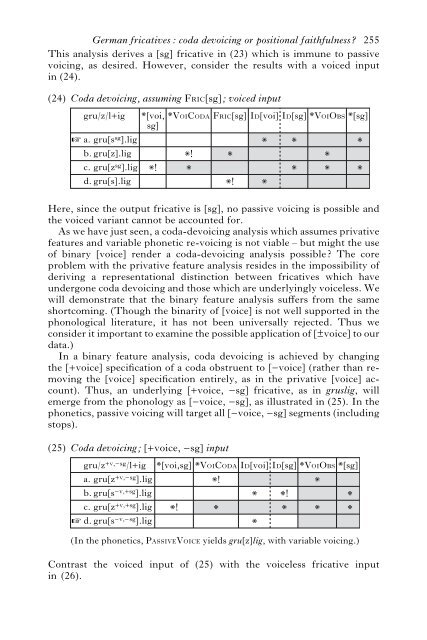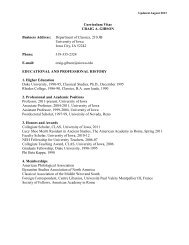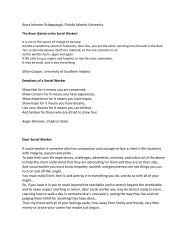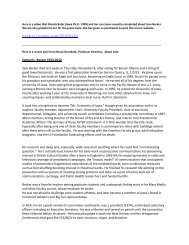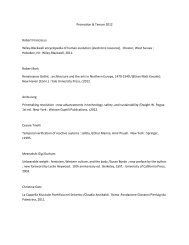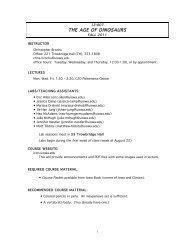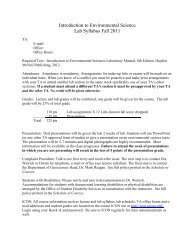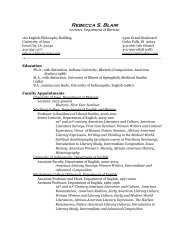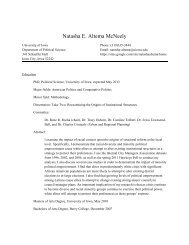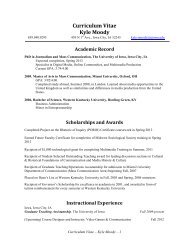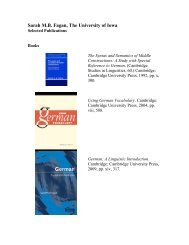German fricatives: coda devoicing or positional faithfulness?
German fricatives: coda devoicing or positional faithfulness?
German fricatives: coda devoicing or positional faithfulness?
You also want an ePaper? Increase the reach of your titles
YUMPU automatically turns print PDFs into web optimized ePapers that Google loves.
<strong>German</strong> <strong>fricatives</strong>: <strong>coda</strong> <strong>devoicing</strong> <strong>or</strong> <strong>positional</strong> <strong>faithfulness</strong>? 255<br />
This analysis derives a [sg] fricative in (23) which is immune to passive<br />
voicing, as desired. However, consider the results with a voiced input<br />
in (24).<br />
(24)<br />
Coda <strong>devoicing</strong>, assuming Fric[sg]; voiced input<br />
gru/z/l+ig<br />
a. gru[ssg].lig<br />
b. gru[z].lig<br />
c. gru[zsg].lig<br />
d. gru[s].lig<br />
*[voi,<br />
sg]<br />
*!<br />
*VoiCoda Fric[sg] Id[voi] Id[sg] *VoiObs *[sg]<br />
*!<br />
*<br />
*<br />
*!<br />
*<br />
*<br />
*<br />
*<br />
*<br />
*<br />
*<br />
*<br />
Here, since the output fricative is [sg], no passive voicing is possible and<br />
the voiced variant cannot be accounted f<strong>or</strong>.<br />
As we have just seen, a <strong>coda</strong>-<strong>devoicing</strong> analysis which assumes privative<br />
features and variable phonetic re-voicing is not viable – but might the use<br />
of binary [voice] render a <strong>coda</strong>-<strong>devoicing</strong> analysis possible? The c<strong>or</strong>e<br />
problem with the privative feature analysis resides in the impossibility of<br />
deriving a representational distinction between <strong>fricatives</strong> which have<br />
undergone <strong>coda</strong> <strong>devoicing</strong> and those which are underlyingly voiceless. We<br />
will demonstrate that the binary feature analysis suffers from the same<br />
sh<strong>or</strong>tcoming. (Though the binarity of [voice] is not well supp<strong>or</strong>ted in the<br />
phonological literature, it has not been universally rejected. Thus we<br />
consider it imp<strong>or</strong>tant to examine the possible application of [Svoice] to our<br />
data.)<br />
In a binary feature analysis, <strong>coda</strong> <strong>devoicing</strong> is achieved by changing<br />
the [+voice] specification of a <strong>coda</strong> obstruent to [lvoice] (rather than removing<br />
the [voice] specification entirely, as in the privative [voice] account).<br />
Thus, an underlying [+voice, lsg] fricative, as in gruslig, will<br />
emerge from the phonology as [lvoice, lsg], as illustrated in (25). In the<br />
phonetics, passive voicing will target all [lvoice, lsg] segments (including<br />
stops).<br />
(25)<br />
Coda <strong>devoicing</strong>; [+voice, —sg] input<br />
gru/z+v, — sg/l+ig *[voi,sg] *VoiCoda Id[voi] Id[sg]<br />
a. gru[z+v, — sg].lig<br />
*!<br />
b. gru[s—<br />
v,+sg].lig<br />
* *!<br />
c. gru[z+v,+sg].lig *! *<br />
*<br />
d. gru[s— v, — sg].lig<br />
*<br />
*VoiObs<br />
*<br />
*<br />
*[sg]<br />
*<br />
*<br />
(In the phonetics, PassiveVoice yields gru[z]lig, with variable voicing.)<br />
Contrast the voiced input of (25) with the voiceless fricative input<br />
in (26).


